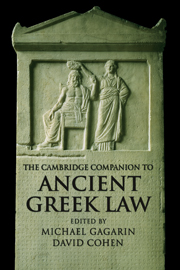Book contents
- Frontmatter
- Introduction
- Part 1: Law in Greece
- Part 2: Law in Athens I: Procedure
- 5 Law and Oratory at Athens
- 6 Relevance in Athenian Courts
- 7 Differentiated Rhetorical Strategies in the Athenian Courts
- 8 The Role of the Witness in Athenian Law
- 9 Theories of Punishment
- 10 The Rhetoric of Law in Fourth-Century Athens
- Part 3: Law in Athens II: Substantive Law
- Part 4: Law outside Athens
- Part 5: Other Approaches to Greek Law
- Index
6 - Relevance in Athenian Courts
from Part 2: - Law in Athens I: Procedure
Published online by Cambridge University Press: 28 August 2006
- Frontmatter
- Introduction
- Part 1: Law in Greece
- Part 2: Law in Athens I: Procedure
- 5 Law and Oratory at Athens
- 6 Relevance in Athenian Courts
- 7 Differentiated Rhetorical Strategies in the Athenian Courts
- 8 The Role of the Witness in Athenian Law
- 9 Theories of Punishment
- 10 The Rhetoric of Law in Fourth-Century Athens
- Part 3: Law in Athens II: Substantive Law
- Part 4: Law outside Athens
- Part 5: Other Approaches to Greek Law
- Index
Summary
One of the most striking features of speeches intended for delivery in the Athenian popular courts is the presence of material that would be considered irrelevant or inadmissible in a modern courtroom. The interpretation of this tendency to include information that does not bear on the legal issue in dispute is central to our understanding of the aims and ideals of the Athenian legal system. In recent years, it has been argued that the courts did not attempt to resolve disputes according to established rules and principles equally and impartially applied, but rather served primarily a social or political role. According to this approach, litigation was not aimed chiefly at the final resolution of the dispute or the discovery of truth; rather, the courts provided an arena for the parties to publicly define, contest, and evaluate their social relations to one another and the hierarchies of their society. On this view, the extra legal arguments in surviving court speeches provide evidence that litigants were engaged in a competition for honor and prestige largely unrelated to the statute under which the suit was brought or the incident that ostensibly gave rise to the dispute. This approach to the Athenian legal system has been challenged by scholars who contend that the Athenian courts attempted to implement a rule of law.
- Type
- Chapter
- Information
- The Cambridge Companion to Ancient Greek Law , pp. 112 - 128Publisher: Cambridge University PressPrint publication year: 2005
- 6
- Cited by

